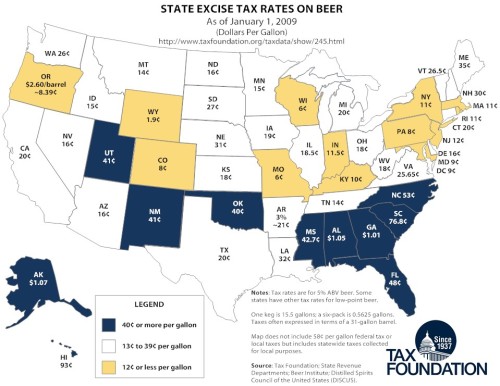CATEGORY I: KEEPING AND SERVING BEER
SECTION II: “SERVING ALCOHOL”
1. The Effects of Alcohol
- Absorption and Elimination
- Absorption is the passage of alcohol into the blood.
- Most absorption occurs from the small intestine due to its large surface area and rich blood supply.
- Generally, the higher the alcohol concentration of the beverage, the faster the rate of absorption. However, above a certain concentration, the rate of absorption may decrease due to the delayed passage of alcohol from the stomach into the small intestine.
- Distribution is the temporary placement of alcohol into various body tissues.
- Elimination is the removal of alcohol from the body.
- Alcohol is eliminated from the body by excretion and metabolism.
- Most alcohol is metabolized, or burned, in a manner similar to food, yielding carbon dioxide and water. A small portion of alcohol is excreted, such as through the breath.
- Diffusion is the method of passage of alcohol through cell membranes and is governed by concentration differences on either side of the cell wall.
- Absorption is the passage of alcohol into the blood.
- Physical and Behavioral Indicators. The following features have been shown to be negatively influenced by alcohol:
- Vision: (visual acuity, depth perception; peripheral vision; and glare recovery)
- Reaction time: simple, choice and complex reaction times
- Tracking tasks: compensatory and pursuit tracking
- Cognitive functions: concentrated attention; divided attention; rates of information processing; judgement; and decision-making.
- Psychomotor skills: coordination; body sway; manual dexterity; and general walking
- Other aspects: memory; risk-taking; overcompensation
2. Responsible Serving
- Legal Considerations
- Regulations vary by state. It is important to familiarize yourself with your states particular laws.
- In General:
- Consuming Alcohol: Person must be 21 years of age to consume alcohol. Acceptable forms of identification varies with state.
- Pouring Alcohol: 21 for bartenders and cocktail servers. Tpyically, 18 to serve alcohol in a bonafide eating place — an area primarily designed and used for the sale and service of food.
- ID Confiscation: Employees have the right to confiscate stolen, expired or false forms of ID. Some states may actually REQUIRE it by law.
- Serving Minors: Illegal across the board. Most states consider this to be a misdemeanor offense.
- Happy Hour Laws: Vary by state.
- Re-corking Laws: Vary by state.
- Serving Hours: Vary by state.
- Healthy consumption: Debatable depending on the resource. Alcohol consumed in moderation is thought to help reduce the risk of heart disease. Most sources say that alcohol in moderation is equivalent to 1 drink over the course of an hour and — for women, 2-3 drinks in one day — for men, 3-4 drinks in one day.
- Good practice in selling alcohol:
- Always check IDs
- Alcohol is not served to intoxicated persons — right to deny service
- Alcohol is not “over-served” — right to deny service
- Encourage water & food consumption
- Call taxi cabs for intoxicated individuals











